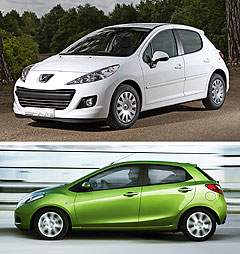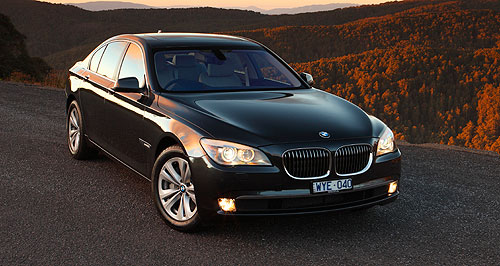Make / Model Search
News - BMWBMW cuts most CO2Headway: Diesel technology has helped BMW slice its CO2 emissions. Peugeot closest to meeting its 2015 CO2 target, but BMW makes biggest gains8 Oct 2009 BMW reduced the greenhouse gas emissions of its passenger car range more than any other major car-maker for the second successive year in 2008, according to a study by the Brussels-based European Federation for Transport and Environment (EFTE). While Peugeot and Honda made the smallest inroads into their average carbon-dioxide output of their new vehicles towards European Union-mandated 2015 CO2 targets, Peugeot is already closer to the goal than all of its rivals. At the same time, the EFTE study shows Mercedes-Benz parent company Daimler remains further away from its 2015 CO2 target than any other car company. The EU last year announced new rules that will gradually limit the CO2 emissions of new vehicles sold in Europe. Every car-maker will have its own specific CO2 limit from 2012, before every new car sold in the EU from 2015 will be limited to a CO2 output of 120 grams per kilometre or less – down from an average of 160g/km in 2007.  Left: The Peugeot 207 Economique. Below: The Mazda2. Left: The Peugeot 207 Economique. Below: The Mazda2.Based on European Commission new-car sales data from 25 EU nations, EFTE director Jos Dings said the car-makers the most distance away from their targets also achieved the greatest CO2 emission reductions last year. “The industry is slowly waking up to the challenges ahead,” said Mr Dings. According to EFTE figures released on October 6, BMW reduced the average CO2 output of its passenger car fleet by 10.2 per cent between 2007, when it emitted 172g/km, and 2008 (154g/km). The EFTE study showed BMW far outpaced its competitors in CO2 reduction last year, with Mazda the next-best performer by reducing 8.2 per cent (172 v 158g/km), followed by Hyundai with 7.6 per cent (161 v 149g/km), Ford with 6.7 per cent (163 v 152g/km) and Suzuki with 4.9 per cent (164 v 156g.km). The worst performers in improvement terms in 2008 were Peugeot, which reduced its output from 142 to 139g/km, and Honda, which fell from 157 to 154g/km, with both makers cleaning up their exhaust emissions by just 2.2 per cent. Also well below the industry average reduction of 3.3 per cent were General Motors at 2.3 per cent (157 v 153g/km), Toyota at 2.4 per cent (150 v 147g/km) and Fiat, which emerged with the lowest average CO2 figure in 2008 (138g/km) but reduced its number only by 2.9 per cent. Renault was also just under the CO2 reduction average at 3.2 per cent (147 v 143g/km), while Europe’s largest car-maker, Volkswagen, was in line with the industry overall at 3.3 per cent (165 v 159g/km). Although no car-maker has yet achieved its 2015 target, Peugeot is the closest with an eight per cent discrepancy (139 v 128g/km), ahead of Renault on 10 per cent (143 v 129g/km), BMW on 11 per cent (154 v 138g/km), Fiat on 13 per cent (138 v 121g/km) and Hyundai, which is also 13 per cent away (149 v 130g/km). Daimler has the most ground to make up when it comes to CO2 reductions, with a massive 23 per cent or 40g/km to cut in just two years (175 v 135g/km). Also faring worse than the industry average of 15 per cent (153.5 v 130g/km) in terms of their distance from CO2 emissions targets is Suzuki on 22 per cent (156 v 122g/km), Mazda on 21 per cent (158 v 125g/km), Nissan on 19 per cent (161 v 131g/km) and both Volkswagen and GM on 17 per cent.
 |
Click to shareBMW articlesResearch BMW Motor industry news |
||||||||||||||||||||||||||||||||||||||||||||||||||||||||||||||||||||||||||||||||||||||||||||||||||||||||||||||||||||||||||||||||||||||||









Facebook Twitter Instagram